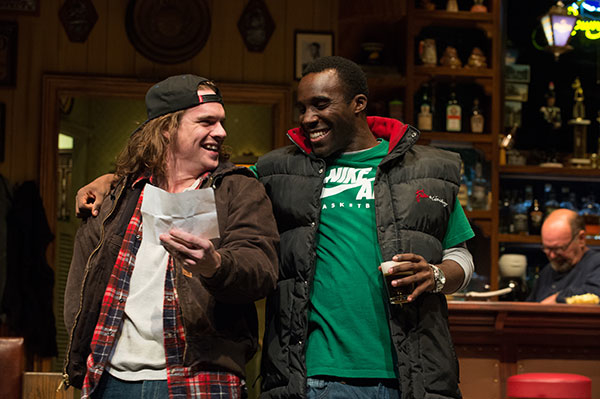Kate Whoriskey Gives America's "New Poor" a Place Onstage in Sweat
"The work that I want to do in the world absolutely should have some social relevance," says director Kate Whoriskey. There are varying philosophies on the ideal relationship between art and activism, but in that regard, Whoriskey has found a kindred spirit in playwright Lynn Nottage. Following their 2009 Pulitzer Prize-winning collaboration on the timely drama Ruined — set in the civil war-torn Democratic Republic of Congo — she reunites with Nottage for their next politically charged project Sweat — a coproduction that started at the Oregon Shakespeare Festival and now moves to Arena Stage in Washington, D.C.
"We are living in a time and place, so I think it's dangerous to cut art off by its roots," Whoriskey says. This time, those roots are all-American, with a play set in Reading, Pennsylvania — one of the poorest cities in the country where she and Nottage traveled to interview locals about the post-millennium industrial decline. The event that inspired the play, she tells us, was personal, but its impact, she hopes, will have a far wider reach.

How did Lynn first approach you with the idea for Sweat?
In February 2012…we met for coffee and she told me she received a letter from this friend. In it, the friend confessed to having these significant financial challenges. She just wanted people to know where she was so she could unburden herself from having to pretend that things were OK financially. I think that friend was so close to Lynn that [she] began to think about the economic crisis in a personal way. She was interested in the class of people who I guess would now be categorized as the "new poor."
How did the research portion of the project get started?
One of my favorite ideas that [Lynn] had that didn't actually happen was she wanted to get a truck that she would drive around the country and she would offer people a beer for their story. Then she came across Reading, Pennsylvania, which is a two-and-a-half hour drive away from New York. Reading, in 2011, was named the poorest city in America, so…we just went and interviewed a bunch of different people who live in this town. We interviewed the mayor, the guy who runs the homeless shelter, a Vietnam vet who then cares for the homeless, women who were homeless — whoever wanted to talk to us. That process was very interesting — to go into a city and not know anybody and just make your way and find what the community is.
Which stories stood out the most?
Lynn was really moved by these steelworkers who lost their jobs basically based on NAFTA (North American Free Trade Agreement). They had been out of work for I think a year at that point. These were people who worked hard all their lives and had a certain way of living that was really pretty good and then it got pulled from them in a matter of months. There was something about that exchange that really moved Lynn. Then [she] began writing the script, which is about the steelworkers.
You and Lynn traveled to Uganda to interview Congolese refugees as part of your research for Ruined. How does Lynn incorporate these kinds of interviews into her plays?
She uses it to spark her imagination, but in terms of dialogue, it's all created by her. It's funny, a lot of people mistake that Lynn is sort of a docudrama person and she really is a playwright. She distills all of these experiences and then creates an imagined narrative.
What have been the biggest directorial challenges with this play?
This play takes place in two time periods — 2000 and 2008 — which is kind of uncomfortably close. So part of it is precision and the clarity of making sure people know that it's in those two different time periods. The other thing is more dramaturgical. In most plays you're trying to [make] an audience empathize with a particular person and everyone supports that one person's journey. But because the play is about unions, [Lynn] really wanted to make it about a community in crisis, so part of it was how to balance the audience's relationship to each character so that it wasn't like, "OK, I pick this one person, and this person is going to take me through the show." You're going to watch all of them go through the experience.
Why is it important for the play to represent different generations?
Because Reading is in such crisis, people who are trying to figure out what should be funded when there's very little money have to make very difficult choices. They're trying to figure out, "Do we give the money to young people? Do we give the money to middle-aged people because they're the parents? Or do we give it to the elderly?" Generally, the impulse is to give it to the younger generation so they can survive. But of course, when people lose their jobs in their forties and fifties it's very complicated because the work force doesn't want to take them. I think Lynn was interested in what gets passed down from one generation to another. What are the good and bad habits of one generation and how they inform the second.
Is the play purely a character study of a community or does it have a larger aim to inspire political action?
I really think one of Lynn's strengths is that she's able to do both. People empathize with the stories so much [and] that empathy allows them to think more politically and socially. She's absolutely trying to throw a light on the new poor and the political policies that are informing people's lives.

(© Jenny Graham)










